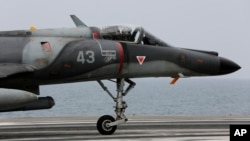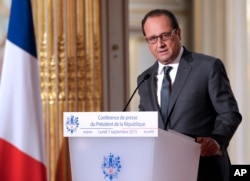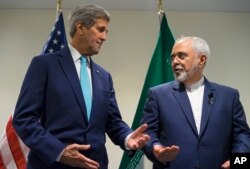France said it has launched its first airstrikes against Islamic State militants in Syria, on targets it identified after two weeks of surveillance flights.
French President Francois Hollande told reporters at the United Nations that six jet fighters hit an Islamic State training camp near the eastern Syrian city of Deir Ezzor.
Prime Minister Manuel Valls said Paris was acting in “self-defense.”
'Autonomous' strikes
Earlier, Hollande’s office said the Sunday strikes were conducted “autonomously” of the U.S.-led coalition attacking insurgent positions in Iraq and Syria, but coordinated with it.
"Our country thus confirms its resolute commitment to fight against the terrorist threat" represented by the Islamic State, the statement said. "We will strike each time that our national security is at stake."
"Civil populations must be protected against all forms of violence," coming from the Islamic State and other terrorist groups, "but also against the deadly bombings of (Syrian) President Bashar al-Assad," Hollande's statement said.
Until Sunday, France had only taken part in airstrikes against the jihadists in neighboring Iraq. Paris has carried out 215 of the nearly 4,500 strikes there.
In another development, Iraq said it has a new agreement with Syria, Iran and Russia to share intelligence in fighting the Islamic State group.
Iraqi officials said Sunday the new effort by the four countries will focus on "monitoring the movements of terrorists" and trying to degrade their capabilities.
Iranian President Hassan Rouhani told National Public Radio in the U.S. that it is too soon to discuss what might follow an Assad regime in Syria, but that “we must all act in unison and have a formula that is required to drive out the terrorists, immediately."
The agreement comes at a time Moscow is increasing its military presence in Syria in support of Assad.
Obama-Putin meeting
Russian President Vladimir Putin is meeting Monday with U.S. President Barack Obama, when both are in New York for speeches at the United Nations General Assembly.
In interviews with two American broadcast outlets, Putin sharply attacked the U.S. support for rebel groups fighting Syrian troops, saying the American involvement was both illegal and ineffective.
The Russian leader described the Syrian army as the only “legitimate” one in the country.
U.S. Secretary of State John Kerry said at the U.N. that “the critical thing is that all of the efforts need to be coordinated. This is the beginning of a genuine effort to see if there is a way to deconflict, but also to find a way forward.” He said the goal was "a united, secular Syria that can be at peace and stable again without foreign troops present. And that's our hope. "
Syrian President Assad also receives support from Iran. That has put both Russia and Iran at odds with the U.S. and its allies who have urged the Syrian leader to step down to resolve the country’s civil war.
The United States, however, says it sees a "major opportunity" in diplomatic talks at the United Nations to end the bloodshed in Syria and to make progress toward achieving peace there.
Secretary of State John Kerry gave that optimistic assessment following his talks in New York Saturday with Iranian Foreign Minister Mohammad Javad Zarif, ahead of the opening of the annual U.N. General Assembly debate on Monday.
"I view this week as a major opportunity for any number of countries to play an important role in trying to resolve some of the very difficult issues [in] the Middle East," Kerry said. "We need to achieve peace and a way forward in Syria, in Yemen ... [and throughout] the region itself."
Kerry said he believes there are chances "to make some progress" during talks in the coming days on the sidelines of the U.N. meetings.
Other issues
Zarif said he plans to focus on full implementation of the nuclear agreement between Iran and the major world powers including the United States.
"We hope that by its full implementation - its good-faith implementation - we can [end] some of the mistrust that has existed over many decades," Zarif said. "So that is my priority. But the situation in the region, the unfortunate developments in Saudi Arabia over the last week, have been disastrous and we need to address them ... in the proper international forum."
The Iranian official referred to the tragedy in Saudi Arabia this past week in which more than 750 people died in a stampede among pilgrims making the Muslim Hajj pilgrimage to Mecca.
A senior U.S. diplomat, Wendy Sherman, said the nuclear agreement takes effect October 18, known as “Adoption Day,” when Iran is to begin complying with its provisions.
Under the agreement, Iran will have to reduce its uranium stockpile, remove thousands of centrifuges and make conversions at nuclear facilities. After Iran's compliance is verified by the International Atomic Energy Agency, all sides in the negotiations will mark “Implementation Day,” when the United States and the other powers involved in the past two years of talks will take action to lift international sanctions against Iran that have hobbled its economy.
“I truthfully don’t know how it will all play out,” Sherman said Friday. The undersecretary of state for political affairs predicted, however, that there would be “bumps along the way.”






